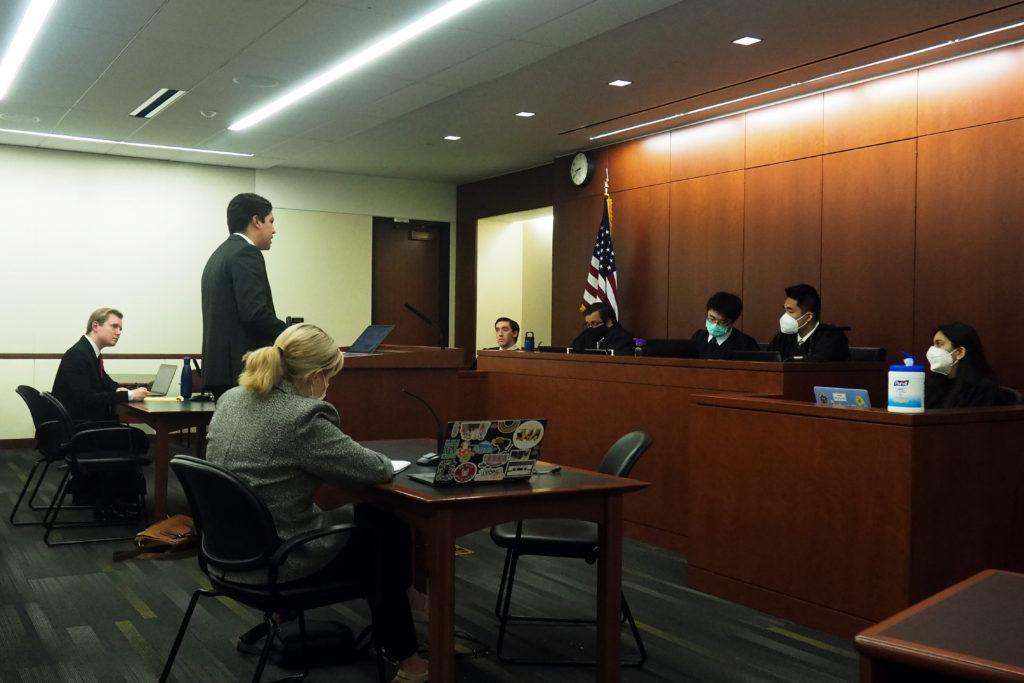Three prospective Student Association candidates submitted complaints to the Student Court after the Joint Elections Commission removed them from the ballot.
Incumbent SA President Christian Zidouemba Tuesday appealed the JEC’s decision to disqualify him from the election for impersonating other candidates while gathering signatures. Mohamed Redzuan Bin Mohamed Raffe, the vice president of external affairs for the GW Entrepreneurship Club, and Aidan Spencer, a prospective candidate for the CCAS-U Senate seat, both submitted complaints Tuesday requesting that they be added to the official ballot.
The Student Court must now choose whether to hear the cases and if so, must schedule hearings for the cases.
The JEC announced in a statement released Wednesday it has retained senior Juan Carlos Mora and freshman Adam Galland as their primary representatives in all actions of the court.
Zidouemba submitted his official complaint Wednesday, which argues the evidence against him is “laughable.” The complaint seeks to overturn the JEC’s ruling and reinstate Zidouemba to the ballot.
The complaint states JEC Chief Investigator Tyla Evans did not present evidence of her allegation that he impersonated Raffe or Spencer, who have both filed in the Student Court appealing their own races. Zidouemba’s complaint says Raffe and Spencer – two of the three candidates the JEC ruled he campaigned for – have maintained that they were not aware Zidouemba was collecting signatures and campaigning for them.
“I find it difficult to understand the rationality behind the accusation that I have gathered signatures for another candidate,” Zidouemba’s complaint, which was obtained by The Hatchet, reads. “As a candidate running for the same office, I would have no motive to sabotage my own campaign by collecting signatures for my competitors. It simply doesn’t make sense.”
The complaint states JEC Chief Investigator Tyla Evans did not present “evidence against him in a timely manner.”
The complaint states Evans presented her evidence – two photos of Zidouemba’s petition sheets with crossed out letters in the candidate slot – to Zidouemba in a Sunday email, before the Monday hearing. The SA bylaws require investigators to present defendants evidence at least six hours before the hearing.
The complaint states that the bylaw requirement for Zidouemba to submit evidence to defend himself 12 hours before the hearing, six hours prior to the chief investigator’s deadline, gives the chief investigator “an unequal and unfair advantage in the production of evidence.”
The complaint states that Evans did not present him with a written statement from Andrew An, whom she called as a witness, meaning Evans did not send Zidouemba all of the evidence she planned to use in the hearing far enough in advance and “depriving” Zidouemba of due process.
The complaint also said Evans did not support An’s testimony with physical evidence, arguing the JEC’s justification for its ruling was unsupported. The filing argues Evans did not present evidence of her allegation that he impersonated Raffe or Spencer.
Zidouemba’s filing asks the Student Court to address his appeal case on an expedited schedule in an effort to reach a decision before the election. If the Student Court upholds the JEC’s ruling, Zidouemba will be barred from taking office even if he wins a write-in campaign, per SA bylaws.
Zidouemba did not immediately respond to a request for comment.
The commission’s statement says Mora will represent the JEC as a student, not in his role as the senate chief counsel. Galland previously served as legislator general and resigned in February. The JEC said it is “confident” the court will uphold the commission’s initial ruling against Zidouemba.
“The JEC is pleased to be represented by this highly able and experienced team, who will ensure the integrity of JEC decisions as well as the security of free and fair elections,” the statement reads.
In his filed complaint, Raffe argues the JEC’s decision not to verify him as a candidate on the official ballot is invalid because the JEC did not communicate the need for students to include GWIDs when signing petitions. JEC and SA bylaws require candidates to include GWIDs from signees for verification purposes.
Raffe’s complaint alleges the JEC disqualified him based on decisions they made about signature verification after candidates had already submitted signed petitions. The JEC published an advisory opinion Monday – five days after the end of the signature-gathering period – saying petition signatures that do not include students’ GWIDs will not be counted.
Raffe seeks to be reinstated to the ballot and for his campaign to be treated impartially.
“If the Plaintiff’s candidacy is not restored expeditiously, he will be unduly deprived the opportunity to present his platform before an important quorum of the GW student body and to fairly demonstrate his capabilities in contrast to the other presidential candidates,” the complaint reads. “The harms imposed by the Defendant are clear, and the deleterious temporal effect of these harms on the candidacy of the Plaintiff only continues to mount with every passing hour.”
Raffe said he collected 394 signatures to meet the threshold of 385 signatures to be added to the ballot. He said the JEC struck down 14 of his signatures after students did not include their GWIDs in the appropriate slot, bumping him down to 380 signatures.
The JEC said in a statement published Wednesday it “stands by its decision” to exclude Raffe from the ballot.
“The JEC welcomes the opportunity for its decisions to be affirmed by the Student Court and looks forward to prevailing on both Mr. Zidouemba and Mr. Raffe’s appeals,” the statement reads.
The complaint Spencer filed Tuesday requests the Student Court mandate he be listed on the official ballot. It claims Spencer “had no reasonable knowledge” of the requirement that students signing his petition include their schools.








